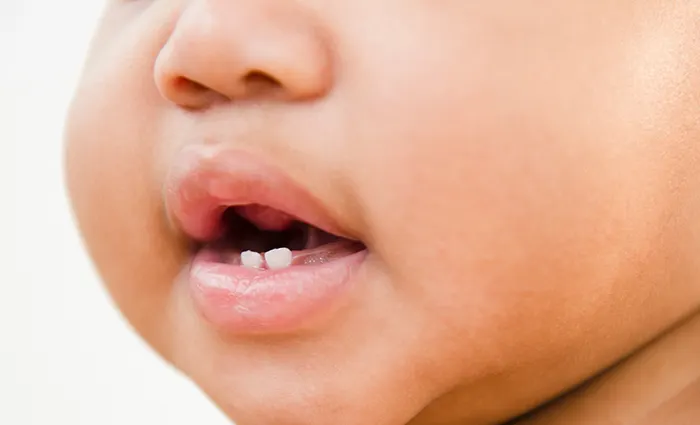
You already know the importance of a daily oral hygiene routine. But did you know it’s just as important for your baby? Your child’s primary teeth are equally as susceptible to cavities and tooth decay as yours are. In fact, tooth decay is the most common chronic infectious disease in children. Baby teeth lay the foundation for their permanent successors, and cavities in baby teeth can lead to a higher risk of oral health concerns later on in your child’s life. It’s important to understand what symptoms to look for, the causes, and how to treat and prevent decay and cavities in your baby’s teeth.
Baby Tooth Decay Symptoms
The first step is to know what decay looks like, and the first place to look is your child’s gums. If they are bleeding regularly, or appear red or swollen, it is most likely a result of trapped bacteria. A specific area to keep an eye on is the gum line along your baby’s front teeth, where small white dots can be the first sign of plaque. Unfortunately, these symptoms can often be very hard to detect without the proper dental equipment, so regular dentist visits should start as soon as the first tooth erupts, usually at six months.
What Causes Cavities in Baby Teeth?
Cavities in your baby’s teeth are the same as those in yours, and are the result of three main factors: sugar, plaque, and acid. The bacteria that’s in the plaque on your teeth breaks down sugar into acid that wears away enamel. Cavities are the holes formed from decayed enamel. This process can start as soon as your baby’s first tooth starts to grow in.
Another huge cause of cavities in baby teeth is something you may use every day: a bottle. When your baby drinks from a bottle or sippy cup, the liquids will pool around their teeth and gums. If they are drinking anything apart from water - like milk, formula, or juice - it means their teeth are essentially soaking in sugars and other cavity-causing residues. It is recommended you wean your baby off of bottles by their first birthday to prevent this type of decay. In fact, you should try to encourage your child get used to a free flow cup from 6 months onward. And lastly, if you leave your baby with a bottle at night, only do so with water.
Treatment for Cavities in Baby Teeth
The good news? Cavities are easily preventable. All it takes are a few good daily oral care habits, and your baby is on the path to a healthy smile. Let’s start with the most important step: brushing at least twice a day with a fluoride toothpaste. Try Oral-B’s Baby 0-2 Winnie the Pooh Toothpaste.
Not only will this help prevent tooth decay, it will also establish an important routine early on in your child’s development. Just put a small smear of toothpaste, the size of a grain of rice, on a manual toothbrush specifically made for baby teeth such as the Oral-B Manual Toothbrush Baby 0-2 Years Winnie the Pooh, and carefully clean your baby’s teeth. Make sure to gently wipe down their teeth and gums with a soft fabric when you’re done. This should start as soon as their first tooth appears.
Another crucial step is steering clear of sugary foods and drinks in your baby’s diet. Fewer sugars means less acid production, and stronger enamel. Read labels and avoid the obvious culprits, like juice and soda, and even dried fruits and starchy carbohydrates like cereal bars. Even foods developed specifically for babies can be high in sugar. And remember: if a bottle is used at night, make sure it contains nothing but water.
Questions Related to Cavities in Baby Teeth
Do cavities in my baby’s teeth affect their permanent teeth?
Yes. Tooth decay and cavities in baby teeth can lead to higher chances of permanent teeth not growing straight or delayed eruption of your child’s permanent teeth.
Should I get my baby’s cavities filled?
Yes, fillings are a safe and preferable treatment choice for babies and baby teeth. This would also avoid spreading the caries in your toddler’s mouth.
Should I brush my baby’s teeth?
Yes. You should start brushing your baby’s teeth twice a day with fluoride toothpaste as soon as their first tooth starts to come in. Dentists recommend an adult do the brushing until age 7, when your child can learn to take the reins.
When should dentist visits start?
The first dentist visit should happen the same time brushing starts – when your baby’s first tooth erupts. After the first visit, it is recommended you take them every 6 to 12 months.
Related Articles
Sign Up
for expert advice and exclusive offers






